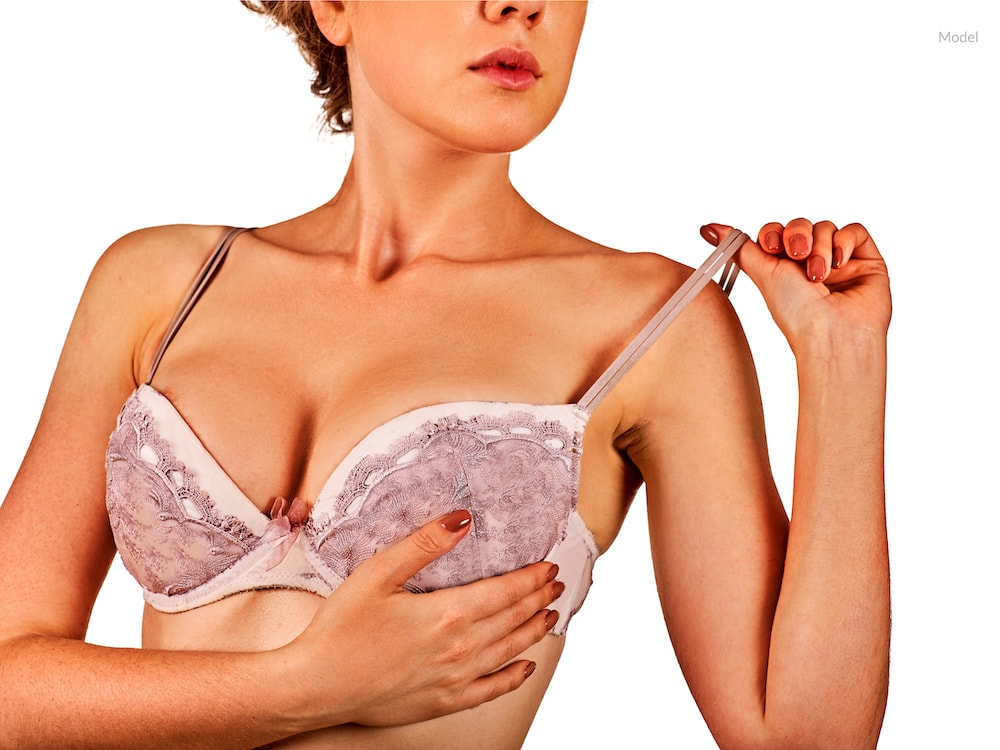4 Minute Read:
Breast implants have been safely enlarging women’s breasts for decades. Breast augmentation surgery allows women to enhance their confidence in their bodies by achieving more proportional and shapelier breasts. While the majority of women with breast implants never experience any complications, breast implants are not without risk. Some of these potential complications are known; others are speculated.

Before you decide to get breast implants, you should understand the risks, read up on breast implant safety, and realize what it means if your implants begin to hurt after the procedure.
How Common Is Capsular Contracture?
Capsular contracture is the most common reason for women with implants to seek out a breast augmentation revision specialist. Capsular contracture happens when the scar tissue around the implant starts to tighten, causing breast implant hardening, chronic pain, and distortion.
Unfortunately, there is no way to relieve or break capsular contracture without breast revision surgery. Capsular contracture treatment involves the complete removal of the implant and scar tissue. While there is no way to prevent capsular contracture, breast implant massages may reduce your risk.
How Hard Is It to Rupture an Implant?
Implant rupture occurs when an implant shell breaks, allowing the saline or silicone contents to potentially spill out into the body. Implant ruptures cause aesthetic complications and pose potential health risks.
Saline ruptures are easily identifiable because the saline is absorbed by the body relatively quickly. This saline is sterile; however, there have been reports of mold developing inside the saline implants. When the implant ruptured, the mold in the saline was also absorbed. It is still unclear what complications this poses long-term.
Silicone ruptures are often silent ruptures. Silicone implants have a thick gel consistency that allows it to maintain its shape and remain in the breast pocket even after a break occurs, at least for some time. If the rupture is discovered early, the damaged implant can often be removed with no problems. Unfortunately, if it is not found, loose silicone can escape into the body and travel toward vital organs, such as the lungs.
Implant ruptures are caused by damage to the implant shell. This can occur after a trauma to the chest (such as a car accident or intense pressure from a breast exam) or can be the result of implant weakening from the initial augmentation. Breast implants are very durable and should not damage; however, rupture does happen on occasion.
Is Breast Implant Illness Real?
Breast implant illness has become a risk even though there is no evidence proving a link between the symptoms and the presence of the implant. This self-diagnosed disease has gained steam over recent years since thousands of women started experiencing the same unexplainable side effects.
Since they all had breast implants, many speculated that the implants must be responsible. This was how the term breast implant illness was started. Breast implant illness symptoms vary; however, they are similar to autoimmune diseases and include headaches, joint pain, muscular pain, anxiety, depression, brain fog, memory loss, and hair loss.
It is believed by some that the silicone in the implant or implant shell causes an autoimmune reaction in the body, and these symptoms are the body’s response to that. As of now, there is no scientific evidence to back that claim.
Do Breast Implants Increase Cancer Risk?
Breast cancer is, unfortunately, an all-to-real fear (and reality) for many women. Some women who have or are interested in getting implants wonder about how it will affect their risk of developing cancer.
Implants do not prevent breast cancer, and patients can still get cancer with implants; however, the implants also do not contribute to it. While silicone does not cause cancer, breast implants, specially textured saline or silicone implants have been linked to cancer of the immune system called breast implant-related anaplastic large-cell lymphoma (BIA-ALCL).
BIA-ALCL develops in the scar tissue that forms around the implants and is not breast cancer. BIA-ALCL cancer symptoms include lumps, bumps, as well as hard and sore breast implants. This condition is tested through a biopsy of the scar tissue and, when discovered early, is very treatable.
Is Breast Augmentation Safe?
Even with these potential complications, breast augmentation is entirely safe. Many women with implants never experience a complication. Others only have to consider a secondary treatment when their implants reach the end of their life (which can be decades).
For women who have to repair a complication with her implant(s), breast revision surgery makes the process easy, safe, and comfortable.
Interested in Learning More?
If you have concerns or are interested in breast augmentation, contact Dr. Andreasen by calling (909) 291-4900 or by filling out our online contact form.

